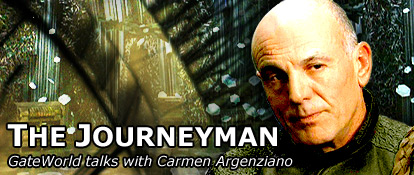
For more than six years actor Carmen Argenziano played a character who will doubtless go down in history as one of Stargate‘s most loved: Jacob Carter, Sam’s hard-nosed military father who became one of Stargate Command’s most important allies when he was joined with a Tok’ra symbiote, Selmak. In Season Eight’s “Threads,” the character’s long journey came to an end.
In our interview, Carmen talks about his current projects and his philosophy toward acting. He also shares his view of playing both Jacob and Selmak, his favorite episodes, working in Times Square as a struggling actor in the 1960’s, and much more.
Carmen will be appearing at the Shore Leave 28 Convention in Hunt Valley, Maryland, July 7 to 9, 2006. Don’t miss it! Visit Carmen Argenziano Online to learn more about the actor!
GateWorld: My name is Denise and I’m talking to Carmen Argenziano, who people probably know as Jacob Carter, otherwise known as “Sam’s dad.” But we just call him “Dad.” So what have you been doing since they decided to kill off Jacob?
Carmen Argenziano: It’s mostly stage stuff. I’m a member of the Actor’s Studio and we do a lot of work here. In fact, I just finished a stage reading of Oscar Wilde’s “Salome” with Al Pacino and Diane Weist at the Tiffany Theater. We did three performances. It was really interesting. And I’m also going to do a play at the Geffen Theater, an Arthur Miller play called “All My Sons.”
And I’ve been doing the typical movie actor stuff, auditioning — CSI, Bones, Cold Case, Without a Trace. But, you know, if you average — and I’ve said this before — one or two out of ten, basically one out of ten, you can actually make a living. That’s a journeyman actor’s life, you know. We go out there and do our dance. Sometimes we get the gig, but mostly we don’t.
GW: I know that you do a lot of smaller roles …
CA: Yeah, of course. I’m not in a position where roles are offered. Although one was offered recently I did something with Dick Van Dyke on “Murder 101,” which is a Hallmark, I think Hallmark.
GW: They have their own cable network.
CA: Right. It was fun working with Dick Van Dyke. He’s a wonderful guy, a lot of fun. And that was one of the few offers. Traditionally you have to go in and read or audition. Your agent submits you, you go in and audition, and whether you get it or not, there’s many variables there — height, age, performance, and who knows. Every once in a while I pop up and sometimes the roles aren’t that big and sometimes they’re like 30 years ago. And it’s interesting.
You know you get residuals …
GW: So that’s good.
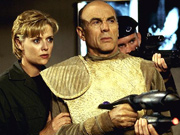
Jacob Carter returns to Stargate Command to help defend Earth from the invisible Reetou in “Show and Tell.”
CA: As time goes by I remember one afternoon getting like 10 residuals in the mailbox. And I was really celebrating at the driveway — I could take my wife shopping and all that. And the residuals ranged from 9 to 12 cents each, so out of the 10 residuals I made like $1.59. Kinda disappointing, you know.
GW: Sounds like it would be.
CA: Sometimes you get a nice surprise. And you know, again, an actor, a working actor, probably 25 percent of their annual income are residuals from past work.
GW: It’d be a nice little bonus in the mail.
CA: So, yeah. The trip to the mailbox may not always be — there’s a nice little apprehension going on there, you know, anticipation of what one may receive. Every once in a while you get a check that might appease the wounds of the last audition you didn’t get, you know.
GW: They said that they killed Jacob off, thinking that the show was going to end.
CA: I think there is some truth to that. I know Richard Dean had specifically said that he wasn’t interested in coming back for another year, and there was a possibility of that happening. There seemed to be some confusion — or not confusion, but not knowing whether there would be another season. Quite possibly The Powers That Be knew — they’re Brad and those people, who are terrific guys and great writers. I don’t know how much information is conveyed down to the cast. I mean, the regulars may have some idea.
I was a recurring role and it went on for about six years. And it was a wonderful, wonderful experience working with Amanda and the rest of the cast and going up to Vancouver. And I enjoyed it, but all things come to an end. So I don’t know if there’ll be any possibility of getting back on for an episode or something. There’s any number of devices they could use — a flashback, or …
GW: This is sci-fi; no one’s ever really dead.
CA: Exactly. So that possibility exists, but I havn’t heard.
GW: That would definitely be something that a lot of people would be very, very happy about. They brought back the Janet Fraiser character for an episode.
CA: Oh, that’s wonderful. She’s a wonderful actress.
GW: Yeah, I’ve been fortunate enough to meet her at a couple of conventions and she’s an absolute scream.
CA: She’s so much fun. I hung out with her in Paris — Don Davis and I and her. And she’s got a lot of energy and a lot of chutzpah, I’ll tell you.
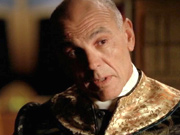
Jacob helps Daniel Jackson infiltrate the Goa’uld System Lord summit in Season Five’s “Summit.”
GW: That would be a very frightening group, because Don is something else.
CA: Don is a fascinating guy.
GW: He’s a very, very nice, gregarious soul and you just … you can’t help but laugh.
CA: He’s a very talented artist and wood carver. And the beautiful paintings he’s done … he’s talented guy.
GW: Yeah, it’s great that he’s got talent in more than one area. Something else to do while you’re sitting there waiting for the residuals to come in.
CA: I wish I was that kind of renaissance man but all I can do I act and you know, take care of my family, bring up my children. That’s basically what I do when I’m not working.
GW: OK, now I noticed that a lot of the stuff that you do — we talked about this before — it’s just little bits here and there.
CA: Yeah.
GW: Do you like doing the shorter bits or would you like to find something that’s more …
CA: Oh, you know, every actor wants the security of finding something a little more substantial on a regular basis. But, again, even the shorter bits the scenes are a day’s work. You’re the new kid on the block you know — set group of the series regulars, much like I was with Stargate when I came in the second year.
In some cases there’s people like Amanda, classy people that go out of their way to be warm and supportive. In most cases it’s impersonal. And you show up and don’t get in the way and you get the blocking of the scene, and they don’t really appreciate your creative input either. You’re just there to do a job.
I guess after all these years I’m somewhat used to it, and that’s fine. The shorter bits are, again, part of a journeyman’s experience. And, of course, they’re classified as guest starring roles for a scene or something but they pay pretty well. And I can’t — I’m not going to do background stuff, of course, or stuff without any lines. I’m not an extra, I am an actor.
So when I’m hired, I’m hired as an actor with dialogue. And with SAG and the protection of the guild and negotiated fee — usually actors establish a daily fee of $2-3000, some cases $4,000, where the union minimum may be $700. So once you’re more established you get much more than the union minimum.
And sometimes a good role comes along in an independent movie you want to do just on a creative basis. You take a salary cut or you’ll work for deferment or whatever, depending on the role. Actors love nice roles as opposed to the stuff that earns them a living. So by doing the other stuff you can satisfy your creative pursuit as well as the other roles that pay less and may have less of an audience and all that other stuff — independents, mostly.
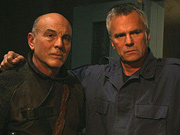
In his final days, Jacob brought vital intel on the Replicator invasion of our galaxy to Jack O’Neill (Richard Dean Anderson). From “Reckoning, Part 1”
GW: I seem to recall Amanda talking about a project she did with JR called “Stuck.”
CA: Let me think … Amanda told you what?
GW: Her and JR Bourne did this short thing called “Stuck,” and it’s people stuck in an elevator, which has never been released anywhere. But it was one of these things where we just did it on a weekend because we wanted to and you get a group of people that all donate their time and all work together.
CA: Yeah, and I’m sure any time Amanda gets an opportunity to get out of those fatigues and boots she’ll jump at it. That’s always fun, going in on that kind of a base, which is like a real kind of family and teamwork thing as opposed to the rigidity of a set and rules.
GW: I know especially with Stargate, they do a lot of special effects. I was lucky enough to get to see the set and it always amazes me how much plywood and styrofoam gets turned into something spectacular on TV. Is it ever really hard, or …
CA: Well, if you’re on location it is. But if you’re in the studio, that’s like a metaphor for Hollywood — Hollywood is styrofoam. It’s smoke and mirrors. So, is that what you were saying, that you were surprised at the in authenticity of everything?
GW: Well, I would imagine that it makes it more challenging, that you’re pretending that this hunk of plastic is something important or you’re looking at this shot of green and the director says, “Yeah, this is …” and look amazed.
CA: Yeah, yeah, that makes it a little bit hard. And there’s this tendency to overdo and the eyes kinda glare, and you feel dishonest and all this stuff. And it takes some practice to do it believably. Every so often I remember doing some scenes with Stargate, even a very long scene with Richard, and because of the camera angle we were having a conversation and I couldn’t look at him. I was looking at a post three feet away. But we had to do this for the camera.
And all those kind of artistic compromises are rampant on the set, as opposed to the theater where actors are much more comfortable working because theater is an actor’s medium while TV and film are a director’s medium. So in theater you get a wonderful five to six week rehearsal period you know your character and the people you’re working with, and it’s a different experience every night — while on a set it’s not quite that fluid.
It’s much more restrictive and it’s a bit more tedious. And you have to know how to orchestrate a scene, where it comes in the episode, what the emotional state is as opposed to a previous scene is since you’re not shooting chronologically. And you make all sorts of adjustments. But that’s part of the profession, that’s part of being a professional. Knowing that and adjusting yourself and doing that. It’s a little more, like I say, a little more less fun than working in a theater.
GW: Everyone talks about how much fun it is on the set, and I’m sure as they years go on it’s less of a “come in, work, go home.” Did you ever get a chance to pull a joke on someone?
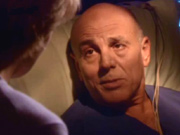
Samantha learns that her beloved father will soon die in Carmen’s final episode of Stargate SG-1, “Threads.”
CA: Oh, jokes, oh gosh — you know, I would. When I went up there, I felt like part of the family after a while and they’re inclusive, too. I don’t know how many episodes they’re up to now, probably a little over 200 …
GW: They’re hitting 200 about halfway through what they’re getting ready to start filming.
CA: Well, all in all I’ve been in about 25 of the 200. So I was somewhat a peripheral. I mean, I was on the set and the fun we had at conventions in Paris and London with Teryl and Don and such — no practical jokes come to mind as far as my experience up there really, other than cutting up on the set and having fun and getting the work done and appreciating the professionalism.
It’s such a well-oiled machine, Stargate. We were always done by seven. Everything was always very well organized, much different than working on an independent where no one knows each other, and even on features where they take the time and the takes … and 20 takes and 30 takes. And TV is more like a factory. So when I went up there I was pretty much — there was really a lot of technical dialogue I had to memorize.
So I really didn’t have time for that kind of behavior, I guess. Although I like to have fun and it should be fun, what we do. And we certainly had some fun, but no one specific practical joke comes to mind. Although I’m sure there were many that I missed out on.
GW: The last episode, where Jacob died, in “Threads,” there was a lot of father / daughter stuff in that. You got to meet Pete and that was a lot of fun. But it seemed to me that Jacob thought, “Yeah, OK, as long as you like him, dear.” But what do you think Jacob thought of the whole Pete thing?
CA: The guy she was with?
GW: David DeLuise, his name was Pete.
CA: I think Jacob always felt that his daughter could marry someone extremely special. As a character I wasn’t terribly impressed — he seemed funny, charming, and goofy. But also, I’m sure as the character I was somewhat preoccupied with my imminent demise and having to break that news to my daughter. I was somewhat conflicted and that scene in the cafeteria where I tell her I just want her to be happy — that was what I really wanted.
And I’m learning as a parent right now that we can’t dictate to our children as far as personal stuff and attractions and directions they’re going. We have so much control over them, and I think Jacob was in the process of letting go of all that. I think Jacob was in the process of letting go of a lot of human values as Selmak. And they, I’m sure, symbiotically got to know each other, and Jacob got to see the universe not from a military American standpoint but from a more universal, more humane kind of awareness that Selmak employed upon him. I think Jacob was evolving through that, too.
GW: He did — he changed a lot from Mr. “look kid, do what I want to” to someone totally different over the course of four, five, six years.
CA: Yeah, he changed a lot. He softened up a bit.
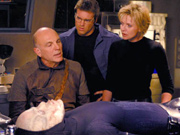
Jacob helps SG-1 investigate Anubis’s deadly new Kull warriors in “Evolution, Part 1.”
GW: He softened up quite a lot. He turned from “Yeah, you got that for a dad” to … I think Jacob ranks right up there with Bra’tac, the characters that you have a hard time finding someone that doesn’t like him.
CA: Yeah, Bra’tac. Tony Amendola is a wonderful actor and it’s a great character he created. He’s such a classy guy.
GW: I know in one episode — or I heard — in “Ascension,” where we got to see Sam’s house for the first time. And I know Amanda was thrilled that she got a house, and she put a lot of stuff in it that was hers. Someone said that at least one of the pictures there it was you — that it was you and your family?
CA: Yeah. My daughter happened to resemble her and she was kind of blondish at the time. And I guess she was about 15 then. She’s 17 now. So they were family shots that they requested, and I sent them up there and they were used to decorate the home.
GW: What did she think of being on TV? Did she like being on TV?
CA: My daughter? She got a kick out of it, even though it was twice removed from reality whatever she still got a kick out of it.
GW: Like we had said earlier, they did an episode where Teryl came back and Martouf came back — the infamous alternate reality, where anything’s possible. Do you think if they were to ever decide that “Hey, Jacob should come back from the dead” in another realty that it would be fun to come back from the dead and take another run at it?
CA: Sure, sure I would love to do that. I mean, you’re talking about the recognition part that actors hope to achieve. This series has been wonderful for me. More people recognize me as Jacob Carter than any other character I’ve played. I have a wonderful affinity for old Jacob, and I love him and I’ll resurrect him anytime they ask.
GW: Do you think you are more like Jacob than like Selmak?
CA: Mmm-hmm — I aspire to be more like Selmak. I like Jacob’s strength and what he achieved on the Earth and in this country particularly. I like Selmak’s evolved, wise overlook of what life really should be. I’ll take Selmak.
GW: If you could pick any one episode that you like, your favorite out of the 25, which one would you choose?
CA: My favorite is “The Tok’ra, [Part] 2,” where I took the symbiote. Maybe that is where there is some confusion. The host, hostess, of the symbiote is a wonderful Canadian actress, just a lovely lady from the theater. It was such a pleasure to work with her and Amanda that day that. I think I did some of my best work in that scene, with I think her name was Jill, and Amanda.

Carmen cites “The Tok’ra, Part 2,” in which Jacob received his symbiote, as one of his favorite episodes of SG-1.
I guess “Tok’ra 2” would be my first, and the very last episode where I died. Although I think the fishing scene came a little too quickly. I say it at conventions: I think I died and they went fishing. I’m leaving this earth and I thought there would be more value, more mourning, more something for old Jacob.
GW: A little more than everyone hopping in the truck and going to Minnesota.
CA: Yeah, right. So, anyway, I think those two episodes stand out to me.
GW: Someone sent me this quote. Al Pacino once said the one great thing about acting is that it allows you to live other peoples’ lives without paying the price. Is there a role, stage or screen, where you found that to be true?
CA: That’s interesting. On stage, I’ve done some stage roles and you get into the character and it was that much fun. And there’s a whole wonderful kind of voyeuristic thing actors have, because you get on the boards of the stage and it’s a safe environment on the stage and they can play people who range from psychotic to anything, because we can explore all those avenues, all those behaviors, all those people that are somewhat dangerous and bring them to a stage.
And I just remember an old acting teacher that told me drama is revelation. The more you work on a role or character the more you discover about him. And in some cases there is self-discovery, too.
And there is a price to pay. I remember working with John Voigt, and he was going to do a role — I think “The Trainer.” It was a very good movie. He was playing a psychotic. He was playing a kind of guy who was somewhat deranged and depressed, who’d lost a loved one. And he knew he had to go there emotionally to fulfill the demands of the role. So, actors kinda have to, without taking themselves too seriously, have to submerge themselves in a role, and sometimes that role isn’t a happy role. It’s a guy with a lot of pain or in a lot of turmoil and you have to explore the pain and turmoil and live with it a little bit.
And that’s why I think actors are selective in doing a comedy after a heavy drama, just getting shaken of that character, to get away from that character and get into something else.
I’m not suggesting that actors are schizophrenic or anything like that. But there are certain emotional demands that a role makes on an actor, and he has to get away from his own head or his own happiness or his own laziness or something and do some research and exploration and try to get into another person’s head.
There isn’t a price to pay because it’s all fake. You know, you can be all these things. I think Deniro said it because he had a difficult time expressing himself, and acting gave him a way of not only expressing himself but people he’s observed. And actors love to just watch. They’re voyeuristic in life and take that onto the stage.
GW: Yeah, I would imagine if you spent eight weeks playing a serial killer you just want to do something different to get away from the death and depression.
CA: Right, because you have to prepare for that every night on the stage. Or if you’re on the set and you have to cry or whatever, you have to take the time to do that.

Jacob leads the Tok’ra when a group of refugees settle at Earth’s Alpha Site, alongside a group of Jaffa. From “Allegiance”
GW: I know that you like being on stage. And I’ve never seen this, but you’ve won awards for “A Prayer For My Daughter.” Can you tell me about that?
CA: It was a wonderful role, a Thomas Bay play, a four-character piece that took place in a Brooklyn police department all night. And it was a policeman interrogating two suspected perpetrators of a crime. And everyone’s live unfolds — two detectives, one detective trying to get in touch with his daughter who’s in the process of committing suicide.
I play a detective who has a heroin problem. Yet he was a detective. It was a really interesting role, Jack Belafonte kind of Brooklyn Italian detective. It explored man’s insensitivities and problems and, you know, the dark side the criminals and police. And you get to the point where you don’t know who’s wrong or right. And I won an L.A. Drama Critics award.
GW: In looking stuff up, someone kept referring to a movie called “Blue Streak.” And there’s something in it, and if people don’t recognize you for Stargate, they recognize you for this.
CA: Yeah, my kids saw it first. Do you know the sequence they’re talking about?
GW: No, I’ve never been able to track it down.
CA: Well, it’s a Martin Lawrence film, I had one of the supporting roles. And I’m a police captain and there’s a scene where I have some sort of rash in my … ah, genital area. And I’m applying some sort of cream down my pants. And he witnesses me doing this through an air vent, because he’s searching for money he left in the police station years ago, or a diamond or something, and he’s posing as a cop. And I come out the door and another cop introduces me to him and I extend my hand. And he’s not about to shake it and he hugs me instead, and I go “This is a little weird, isn’t it?”
And my kids — a lot of people come up to me for this and I typically extend my hand and they just crack up.
GW: And I can imagine why!
CA: That’s a hell of a way to make a name for yourself though, isn’t it? My children saw that and go, “Ooh, Dad! Eww, gross!” And I say, “Yeah, well that paid this month’s mortgage, it’ll pay next month’s mortgage, and it’s putting food on the table for you — so shut up!”
GW: I know every actor has odd jobs that they’ve done when they were just starting. RDA was a mime and a juggler. Did you have an odd job?
CA: I had a real interesting job on Times Square when I was a student in New York. And it was supposedly analyzing people’s handwriting in a little booth right in Times Square in New York City. And what we were using was an old ancient IBM sorter machine. I think you saw that in television in The $64,000 Question. And we had about 12 different combinations for men, women, couples, young, old, thin, fat — and we’d size up the person and press anything from one to 12 and the old sorter machine would light up and then cards would fall in these little columns, and we’d pick out about 10 each and we’d give them about seven to eight perforated cards. And we’d usually hit on one or two qualities that they had.
It was Times Square, and I had to make a living. It was a shot, and you had to bark out to the crowd and occasionally you’ll get someone that knew computers and say, “Hey, that’s a sorter, it’s no computer! It’s a rip-off!” And you’d go, “OK buddy, all right, keep moving.”
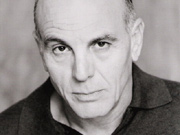
After Stargate, Carmen Argenziano continues working stage and screen.
But it was New York City in the 60’s and I would sell concessions at the Broadway shows. Barbara Streisand was doing “Funny Lady” then, and you’d go to different shows and sell concessions during the different acts. There were so many shows — “Oliver” was playing then, Pete Lawrence was doing “What Makes Sammy Run.” I was working in that show. “Something funny happened on the way to the forum.”
Yeah, it was a wonderful period. I became a real Times Square character. I knew all the drunks and prostitutes. And it was almost like a big Times Square family; there were the drug addicts, too, but they weren’t as rampant. The winos too. But, I never saw any violence, never saw anyone hurt each other. I really don’t know what New York is like now. This is 40 years ago.
GW: It almost seems like a bit of a carnival atmosphere.
CA: It was. It was right across the street from the Latin Quarter — all the beautiful ladies. And, yeah, it was interesting. I was like 20.
GW: I notice that a lot of the characters you play end up being authority figures — an editor in West Wing, Jacob the general, police detectives. Is that how people see you?
CA: It’s funny if that’s how people see me, because as far as being an authority figure, I’m so far from being an authority figure in life. I always resented authority, I was a bit of a rebel it guess. I guess as I got older and lost my hair … and I come off somewhat authoritarian, I guess, in a role.
Again, the whole thing about being an actor, that’s what is wonderful about it. You can be something you’re not. And I play authority figures well, although not in life. I play strong, angry, so many things that are much different than who I really am, which is a pussycat. Not pussycat, I’m just not that … I’m pretty level-headed kind of …
GW: Laid back?
CA: Yeah, I am laid back, although I have a lot of restless energy. I’m always up and about. So I fidget a lot. Other than that, I’m a pretty peaceful guy.
GW: You mentioned that you auditioned for Bones and CSI.
CA: None of which I got.
GW: Is there something else coming up?
CA: Other than that Dick Van Dyke, “Murder 101,” I have a nice scene in “Angels vs. Angels” which has George Burns and Frank Gorshin, both of which are dead, but it just come out.
Things have slowed down a bit, which is why I’ve decided to get back to workshop and actors studio things and keep the acting jobs going. I just want to stay in shape now for whatever remains of my career.

